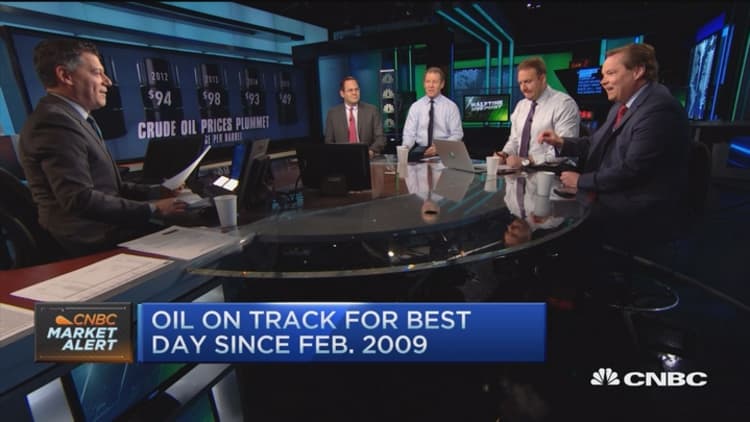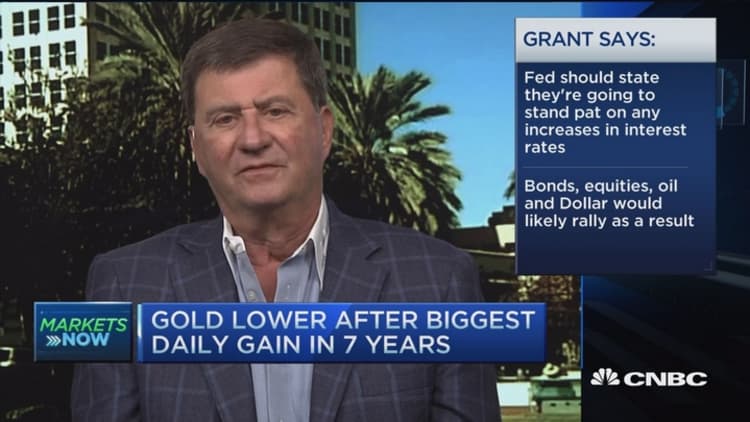


Oil prices rallied more than 12 percent Friday on renewed prospects for an output cut among the world's oil producers, but analysts and market watchers told CNBC that traders shouldn't hold out hope.
Crude prices spiked Thursday afternoon after UAE Energy Minister Suhail bin Mohammed al-Mazrouei said consensus was forming within OPEC that it was time to discuss cuts with nonmembers. He also said current low prices had forced some members to cap production.
Michael Cohen, Barclays head of energy commodities research, said he was not moved by the latest news, which follows a string of similar comments from oil ministers and petroleum executives in recent weeks.
"We think it's a lot of false hope. Basically what's been happening over the last month is, as the market's gotten increasingly short, anytime that we see these kinds of headlines, they result in this kind of rapid change in the price," he told CNBC's "Squawk on the Street" on Friday.
Cohen said there was simply too much distrust between de facto OPEC leader and top oil exporter Saudi Arabia and No. 1 producer Russia, which he noted has agreed to cuts in the past, but has only enacted very small ones in reality.
To be sure, short covering also fueled Friday's drive as some traders believe oil hit a technical bottom Thursday, when U.S. crude fell as low as $26.05. It settled above $29 on Friday. Citigroup has said the bottom is at the $26 level.
There was nothing new in Thursday's UAE headline, and the reaction in oil markets has been overblown, John Kilduff, founding partner at advisory firm Again Capital, said Friday.
"There was a lot of momentum players in this market, and yeah, this is your worst nightmare," he told CNBC's "Fast Money: Halftime Report." "You see a headline like this and you just got short the market, you're going to puke your position. That's what we're seeing here today."
He said Saudi Arabia will not be content until it is certain it has inflicted enough pain on competitors, particularly U.S. drillers, whose production gains in recent years contributed significantly to an oversupply that OPEC estimates at 2 million barrels a day. Kilduff reiterated his called that oil will fall to $18 a barrel before the market rebalances.
Dennis Gartman, publisher of The Gartman Letter, noted that the CEO of Russian oil giant Rosneft, Igor Sechin, had recently changed his tenor, suggesting he could possibly be open to output cuts. But he too said a production drawdown was unlikely.
Gartman told CNBC's "Squawk Box" on Friday that a meeting to discuss cuts would probably happen and "maybe" yield a productive outcome, but there was absolutely no chance OPEC members would abide by quotas.
"If there's one thing we've learned from history, whatever OPEC says about curtailing production never comes to fruition. Everybody cheats," Gartman said.
Both Gartman and Cohen noted that Russian producers are technically unable to reduce production right now because temperatures are so cold, wells would freeze and need to be redrilled.
Hilltop Securities Managing Director Mark Grant said Friday he believes technological innovation in the American oil patch has broken the established order in crude markets.
"We can produce more oil and deliver more oil than anybody in the world, which means that all the producing nations — Russia, Saudi Arabia, Libya, Yemen, you can go through the whole litany — are toast. And I mean toast because they'll never recover. And so the whole energy game has changed," he told "Squawk Box."
U.S. drillers still typically face a higher cost of production oil than OPEC members, and they are feeling the pain. Since last year, 48 North American oil and gas companies have filed for bankruptcy, according to law firm Haynes & Boone.
Many of these are shale drillers who rely on an expensive process called hydraulic fracturing, which entails pumping water, minerals and chemicals deep underground to break up rock and free oil and gas.
But BP suggested the current rout could pay off for shale drillers in the long run, as tough times force them to become more efficient, Reuters reported. In its 2035 Energy Outlook, BP forecast shale production would grow to 8 million barrels per day in the 2030s from about 4 million barrels today, according to the news agency.
— CNBC's Patti Domm contributed reporting to this story.



